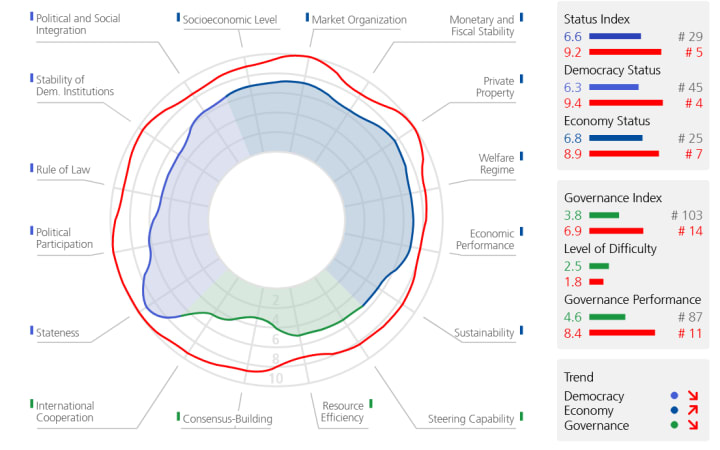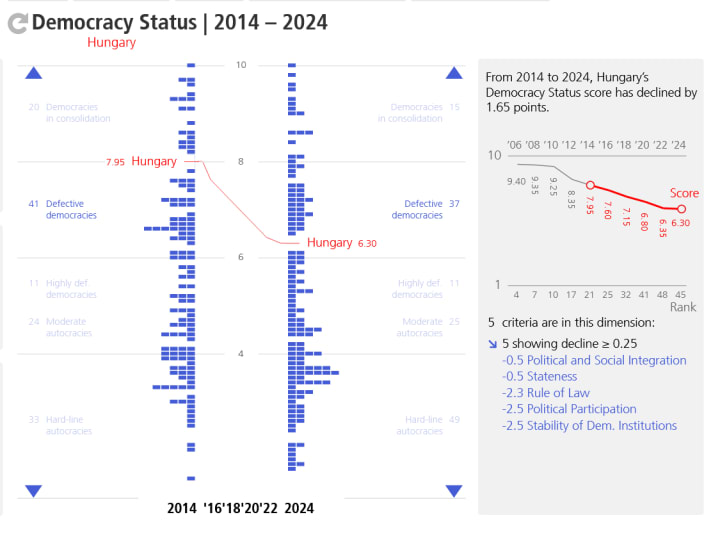In Orbanistan
Hungarian Democracy Declines Even Further

Liberal democracies are declining worldwide, as a new study by the Bertelsmann Foundation shows. In this reverse wave of democratization, Hungary stands out as a negative European example. Once the forerunner among the countries in transition, Budapest has been relegated year by year to become the pariah in the Western world. The process is closely linked to Prime Minister Viktor Orbán, who has governed the country since 2010.
From Gulash Communism to Orbanistan
During the 1980s, Hungary was considered the "happiest barrack in the camp." The country had the highest living standards in the Soviet sphere - but also the highest rate of suicides. Dictator János Kádár governed following the mantra "who is not against us is for us," turning the Stalin bonmot 180 degrees around. Still, the regime was bound to fail, and a young and dynamic Viktor Orbán contributed to the collapse by publicly announcing that the Russians (Soviets) should go home. After more than a generation, Orbán is still around - and the system he established reminds us in many ways of that of Kádár.
Hungary's Democracy on the Downturn
Since Orbán retook power in 2010 to serve his second term (he governed from 1998-2002, too, but with fewer autocratic tendencies), the quality of democracy in Hungary has declined. Compared to 2006, Hungary was relegated from rank 4 (9.4/10) to rank 45 (6.3) in the democracy status - a sharp and continuous decline among countries in transition.
Democratic decline in Hungary

Since 2014, Hungary has not been considered a democracy in consolidation anymore but a defective democracy. The country has "stabilized" on a very low level during the last two years, at the border of the "highly defective democracy" category.

The results regarding the parameters of economic performance and governance quality are also bad. In several areas, such as health care, education, and equal opportunities, Hungary underperforms not only in the EU or OECD average but also compared to neighboring countries in the region. Where are the reasons?
Ideology or Currency?
Over the years, Orbán and his Fidesz party went a long way from the liberal center via the center-right to the populist right. Orbán became the loudest voice for illiberal and anti-European narratives on the continent. This drove the country into an infight with the European institutions. As a result, European funds to push Hungary's economic development were blocked. Orbán reacted with blackmailing (using the unanimity rule in some European policies) and some institutional adaptations that are more Potemkin villages than clear-cut reforms. In many cases, Hungary lost cases at international courts - with little effect.
Interestingly, the reasons for Orbán's stance are not ideological, although his agenda is built on populist narratives, right-wing topics (anti-migration), and othering. Compared to Poland, where the Pis-party's leaders were convinced of right-wing ideas, in Hungary, right-wing rhetoric by former liberals sounds artificial. Instead, the reason for Orbán's numerous volte-face moves must be found elsewhere, not in ideology.
Power - and what it takes to keep it
When Orbán lost power in 2002, he was convinced that the problem was missing resources. His opponents, the Socialists, got rich during the spontaneous privatization during regime change around 1989. Fidesz, Orbán's party, lacked organization, resources, and manpower. The first step to resume office was to let some money pour in. The scene here was the municipalities in cities governed by Fidesz mayors. Public procurement from thereon was closely linked to politics, making some people very rich. These oligarchs later used their newly acquired wealth to invest strategically, especially in media outlets. Within a few years, the disadvantaged Fidesz became the gatekeeper in the media landscape. This was step 2 and led to winning the elections in 2010.
Once in power again, the party used the state to capture administration, and intermediate organizations like state media, courts, and many more. State media turned into party propaganda outlets, and judges lost their independence. The electoral law was deformed by gerrymandering the electoral constituencies. Step 3 anchored Fidesz in the state, but catapulted Hungary to the democratic offside.
Nemzeti Együttműködés Rendszere (NER)
Sounds complicated, but it is pretty easy to comprehend. The "System of National Cooperation" is a network in which state institutions, companies, and civil organizations cooperate in favor of the Fidesz government. NER people are involved in all significant spheres of society, especially in the economy. They ensure that the flow of resources into Fidesz-politicians' pockets does not stop. In the end, we have to speak of corruption that is directed by the state itself.
In step 4, state pressure was widened to all opposition organizations, with laws denouncing opposition politicians or journalists as foreign agents or enemies of the nation. Now, Orbán has complete control of the country.
The light at the end of the tunnel
But the system is not immune to change. There are several threats to the Orbán regime, both from within and from outside.
1. The European Union. The EU has changed its direction. Instead of searching for compromises, Brussels confronts Budapest and reacts to Orbán's blackmailing by cutting sources. The EU is the only remaining power to balance the country, as internal control was amputated.
2. The existing opposition? Not really, because they lack unity and organizational capacity. They need fresh blood.
3. Whistleblowers. The case of Péter Magyar, the former husband of a major Fidesz politician, who made internal issues of the NER public, made society move a bit. He could become a formative force for the opposition.
4. NER-externals. Like in every chain-letter or pyramid game, only the players that are there initially will make the big money. The more people want to participate and secure gains, the longer the waiting list, the more resources are needed. The tipping point will arrive, and the system will collapse as no more sources are available to widen the game.
Until then, Hungarians pay the price: cut-off civil rights, poor state services, high losses via corruption and high taxes, high inflation, and the rule of law challenged. This cannot hold forever. But the ruling elite knows that if they lose power, it will be existential. They will cling to it with whatever it takes.
About the Creator
Jurgen Dieringer
J Dieringer is a professor of international relations by profession and a musician, writer, and chess player by passion. He strives to merge those inputs and tackle the intersection of arts and science.






Comments
There are no comments for this story
Be the first to respond and start the conversation.